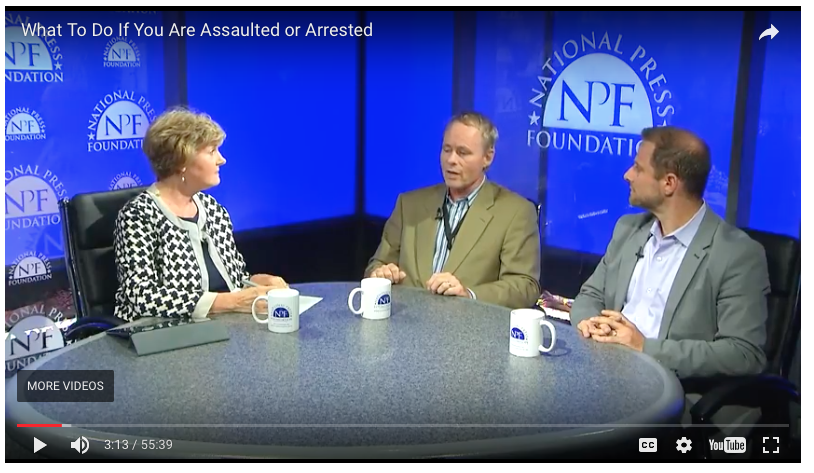Today, however, the advice to reporters covering politics, demonstrations, and even run-of-the-mill public meetings has shifted: program your lawyer’s number on your smartphone’s speed dial, and make sure your bank account is flush so you can make bail if you find yourself in handcuffs.
"What To Do If You Are Assaulted or Arrested"
https://goo.gl/gc6HgC
Increase in risk
Unfortunately, hazards aren’t reserved for war correspondents trekking through conflict regions and dodging bullets. Apparently, attending public meetings and interviewing political figures come with a level of physical risk, as seen in a few recent incidents of reporters being shoved and knocked around.
For example, in May, John Donnelly, a senior defense writer and reporter with Congressional Quarterly Roll Call, was pinned against a wall in a public hallway at the Federal Communications Commission building.
“We shined a pretty bright light on what they did,” said Donnelly, a panelist on the webinar, livestreamed from The Evelyn Y. Davis Studios in Wash, D.C. “Don’t be silent about it. Hold them accountable.”
Suggested protocol
So what should a reporter do in these situations?
National Press Foundation President and COO Sandy Johnson, who served as panel moderator posed: Does the press cower, reserve questions only for sanctioned press conferences, or go through a dedicated public information officer for comment?
“I hope newsroom leaders figure out guidelines and strategies to share with reporters on the front lines,” Johnson said.
Some strategies are proactive, like identifying a safe meeting place to retreat to in case of emergency, said Kevin Goldberg, the media attorney on the panel. Also, before leaving the newsroom, reporters are advised to program into their phone names and numbers of media lawyers.
It doesn’t hurt to save contact information for a media organization that defends reporters like the National Press Foundation (NPF), the Society of Professional Journalists (SPJ), Reporters without Borders (RSF) and the Committee to Protect Journalists (CPJ). (Editor's note: Create a laminated emergency card in case your phone or notebook gets taken away. Keep the card in your pants or sock.)
"Don’t be silent about it. Hold them accountable.” reporter John Donnelly
| Further, Goldberg recommended reporters practice keeping cool so when they are faced with arrest, their demeanor works in their favor. “If you find yourself being threatened or in a violent situation, stay calm, try to record the incident on your smartphone, camera or recorder, get names and lock eyes with someone sympathetic in the crowd. Get them to realize you’re in trouble,” said Goldberg, with the law firm Fletcher, Heald and Hildreth. Despite the competitive nature of the news industry, it might not be a bad idea to collaborate with fellow reporters and news outlets by working in teams. “Set aside competition for the sake of safety,” he said. | Tips for journalists in the field
|
"How to Deal With Intimidation," webinar hosted by the the National Press Foundation
https://goo.gl/eJ6SDZ
Johnson, the moderator, continued with questions from audience members attending via Facebook and Twitter: “What do these incidents mean for reporters, and more importantly, for the public?”
Donnelly was quick to chime in: “What really sticks in my craw, are people who ask, ‘Why should we care [about threats to the press]?’ This is the heart of this whole issue.”
He said: “The National Press Foundation and all of these groups need to really think about educating the public about the importance of the press. If a large number of people don’t get that, then we’re not going to be protected.”
The panelists agreed that keeping silent mutes the press and merely perpetuates potential attacks. Rather than taking a defensive approach, it is best to use a seemingly isolated incident, such as shoving, as a reminder that a threat to the press is a threat to everyone’s right to know.
Don’t forget, Goldberg went on, that citizens have a right to record in public. Earlier this month, in fact, the Third Circuit Court of Appeals upheld the First Amendment right of journalists and private individuals to observe and film police officers on duty. As part of that case, the ACLU defended Temple University student Richard Fields who was arrested in 2013 while using a mobile device to photograph Philadelphia police officers breaking up a house party.
The limitation to recording in public, of course, is making sure you are not thwarting the efforts of police or emergency personnel.
“Just as long as you’re not getting in the way,” Goldberg added.
Jennifer Karchmer is an independent journalist who covers freedom of the press, conflict reporters, reporter safety, and legal issues related to the media. Don't miss her podcast The jPod, Interviews & Conversations from the desk of a journalist. Connect via the social media links below.
| Links & further reading:
| Follow on Twitter: @NatPress @sandykjohnson @kevinmgoldberg @johnmdonnelly @jaschneider87 @journalist_jk #pressfreedom #reportersafety |



 RSS Feed
RSS Feed